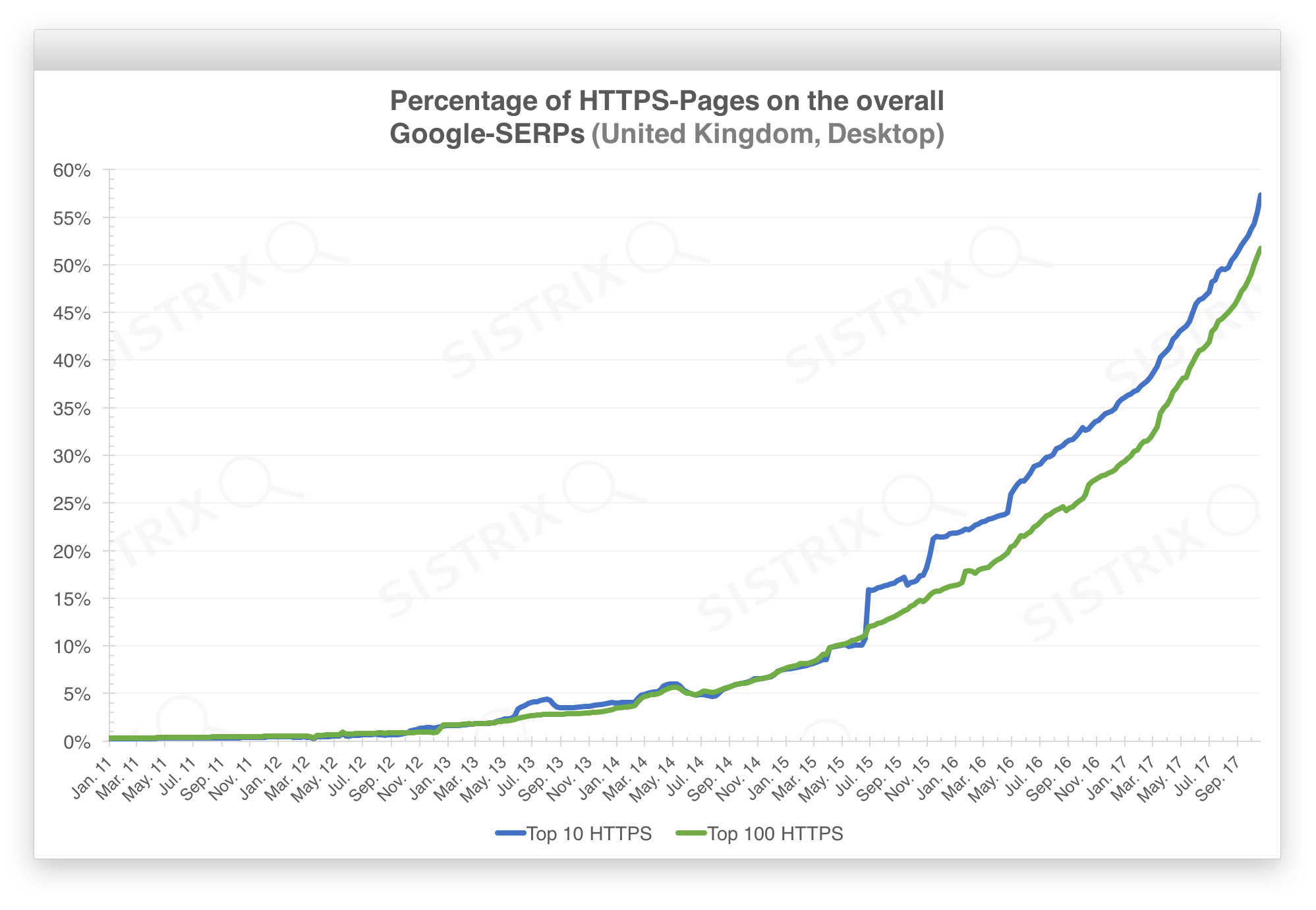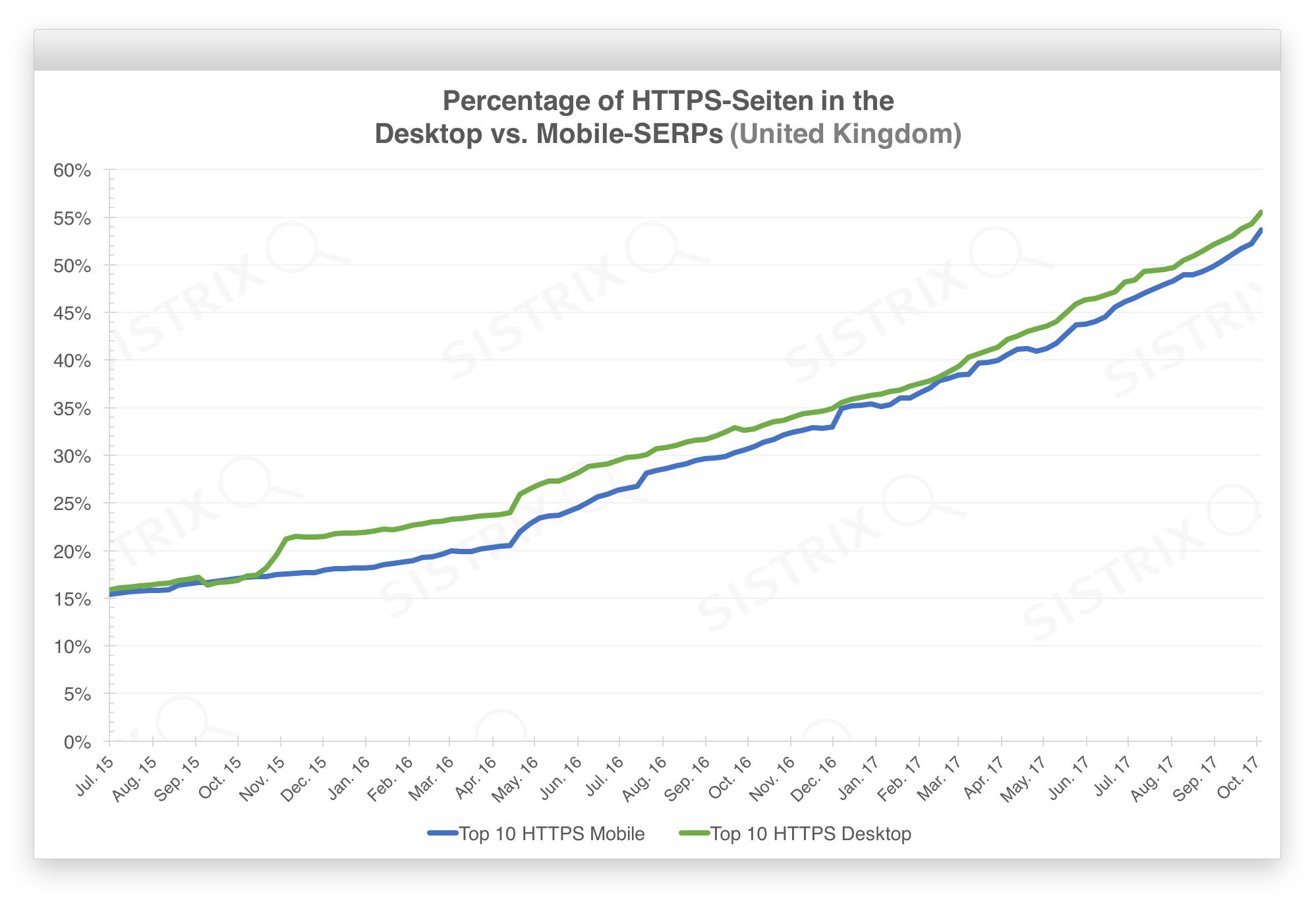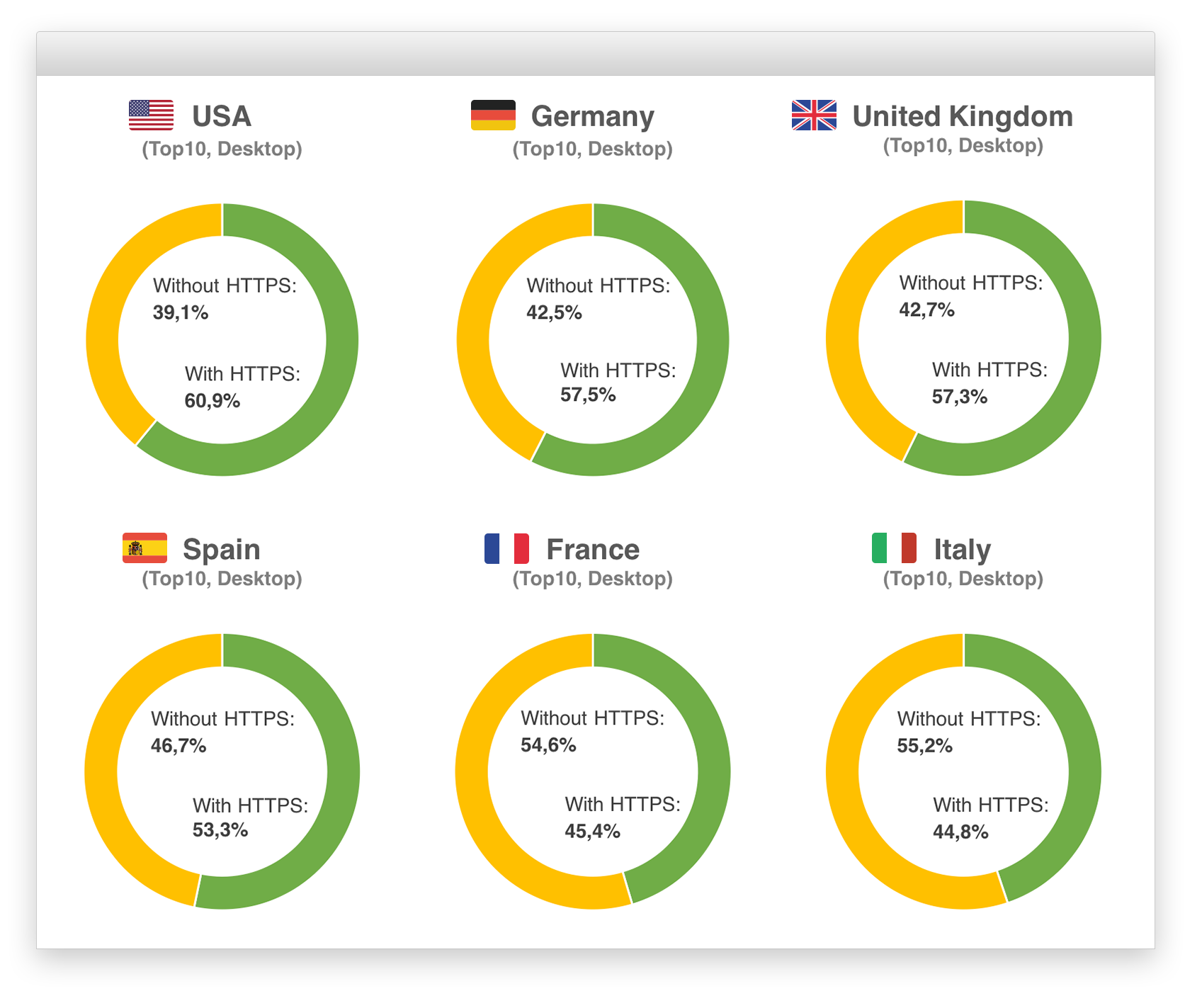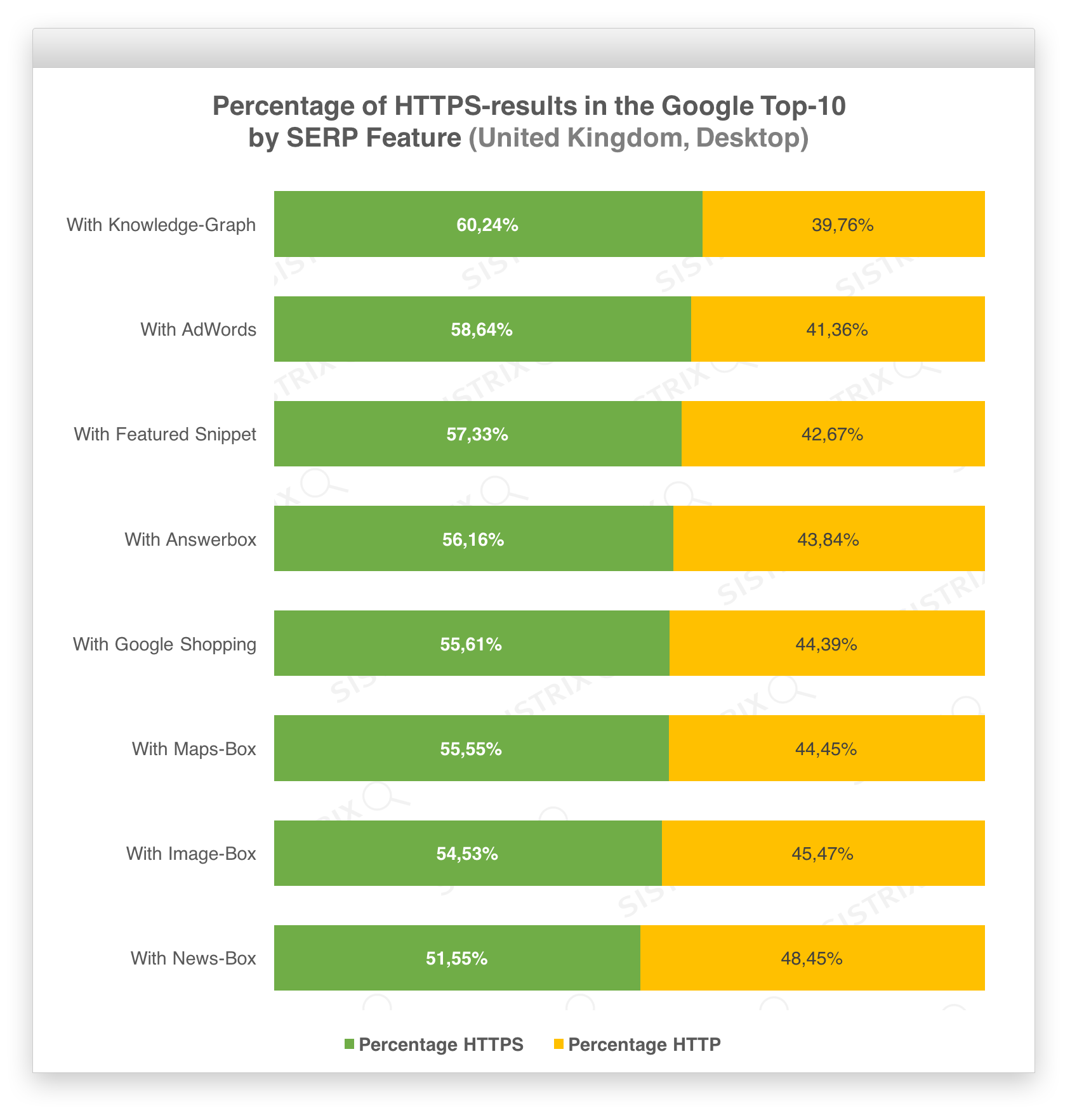Encrypting your communication through HTTPS is a topic close to Google’s heart. Mountain View showed this somewhat awkwardly by vaguely hinting at a possible connection between good rankings on Google and the use of HTTPS. From that point on, we have kept an eye on the state of the HTTPS implementation in the SISTRIX-blog.
It has nearly been a year, since our previous article on HTTPS and we have, once again, analysed multiple billions of results, in order to evaluate the current status-quo on the switch to HTTPS/SSL. In this article we want to show you our results and answer the most important questions on the topic.
How many results have already switched to HTTPS?
In our first evaluation, let’s take a look at the percentage of HTTPS-sites in the Google results for the United Kingdom (desktop). In this chart we have the first 100 results with an additional, closer look at the click-relevant Top-10 results:

The Top-100 first managed to hit the 50% mark around mid-July of this year. This means that now, more than half of all Google results are SSL-secured. The Top-10 show an even higher adoption: close to 60 percent of the results are now HTTPS.
If you are wondering about the noticeable increase in mid-2015, that is all due to Wikipedia.org switching to HTTPS. There is no evidence that points to Google giving favourable treatment to HTTPS-pages.
Are there differences for the mobile results?
Our second evaluation takes a look whether there are differences between the desktop and mobile results, when it comes to the HTTPS implementation. Google has been very vocal on the topic of a “mobile index” over the past few years – without having much to show for it, at the moment. In this chart, we want to take a look at the percentages of HTTPS-pages in the Top-10 results for desktop and mobile, over time:

As we can see, there is currently only a slight difference between desktop and mobile, with desktop coming out on top by a few percentage points. It is therefore safe to assume that (at least for this topic) there is close to no difference between desktop and mobile results.
How are other countries faring?
Regardless of how much Google may try to push and urge, the actual switch to HTTPS fully depends on the webmasters themselves and may have varying degrees of complexity, depending on the technical setup of the site. In order to get a feel for how far along the switch is for different countries, we collected the current values for the Top-10 Google results for the USA, Germany, the UK, Spain, France and Italy:

It does not come as much of a surprise to see the USA being the furthest along: more than 60% of all Top-10 results are handled over a secure, SSL-encrypted connection. Both the UK as well as Germany are close at the United States’ heels. Spain is also already past the 50% mark of Top-10 results with the HTTPS protocol. Only France and Italy have some way to go before reaching the 50 percent threshold.
Which big sites have yet to switch to HTTPS?
My hunch was that large sites should be quicker in switching to HTTPS because they have all the necessary resources on hand. In order to test this idea, We checked out the 100 domains in the UK with the highest Visibility Index score to see how many percent of their ranking URLs already show HTTPS and how many still return HTTP.
You can use the Toolbox to check your own domain, if you want. Just click on the “URLs” evaluation in the SEO Module.
Here we have our “List of Shame” for all the most visible domains that return less than 50% of their ranking URLs in Google in an encrypted state.
| Domain | Amount HTTPS | Amount HTTP |
|---|---|---|
| currys.co.uk | 0.0% | 100.0% |
| metrolyrics.com | 0.0% | 100.0% |
| preloved.co.uk | 0.0% | 100.0% |
| techradar.com | 0.0% | 100.0% |
| thesaurus.com | 0.0% | 100.0% |
| tvtropes.org | 0.0% | 100.0% |
| wikia.com | 0.0% | 100.0% |
| yourdictionary.com | 0.0% | 100.0% |
| billboard.com | 0.1% | 99.9% |
| cnn.com | 0.1% | 99.9% |
| dailymail.co.uk | 0.1% | 99.9% |
| imdb.com | 0.1% | 99.9% |
| rollingstone.com | 0.1% | 99.9% |
| discogs.com | 0.2% | 99.8% |
| diy.com | 0.2% | 99.8% |
| ikea.com | 0.2% | 99.8% |
| independent.co.uk | 0.2% | 99.8% |
| investopedia.com | 0.2% | 99.8% |
| mirror.co.uk | 0.2% | 99.8% |
| debenhams.com | 0.3% | 99.7% |
| urbandictionary.com | 0.8% | 99.2% |
| argos.co.uk | 1.0% | 99.0% |
| songfacts.com | 1.1% | 98.9% |
| moneysavingexpert.com | 3.1% | 96.9% |
| telegraph.co.uk | 4.0% | 96.0% |
| next.co.uk | 4.8% | 95.2% |
| deezer.com | 6.1% | 93.9% |
| express.co.uk | 7.3% | 92.7% |
| bbc.co.uk | 10.6% | 89.4% |
| asos.com | 10.7% | 89.3% |
| www.nhs.uk | 12.0% | 88.0% |
| thefreedictionary.com | 19.0% | 81.0% |
| boots.com | 23.0% | 77.0% |
| webmd.com | 23.7% | 76.3% |
| huffpost.com | 28.6% | 71.4% |
| allmusic.com | 32.0% | 68.0% |
| ebay.co.uk | 34.5% | 65.5% |
| mayoclinic.org | 37.9% | 62.1% |
| wordreference.com | 38.2% | 61.8% |
| nytimes.com | 38.9% | 61.1% |
| medicinenet.com | 40.2% | 59.8% |
| ebay.com | 40.7% | 59.3% |
| huffingtonpost.com | 42.7% | 57.3% |
| wikihow.com | 47.1% | 52.9% |
| screwfix.com | 48.0% | 52.0% |
A large amount of sites that have not yet (fully) switched over are advertising-financed (news) publishers. For them, it may well be the case that their external (unencrypted) Ad inventory is in the way of a switch to HTTPS. That even huge publishers can find a way to make the switch already can be seen with domains such as thesun.co.uk, ft.com or theguardian.com, all of which have about 95% of their pages on Google as HTTPS.
When it comes to government websites, like nhs.uk, you could presume that the lack of HTTPS has more to do with internal structures and systems. Especially seeing how another government site, nih.gov, manages to have 98,1% of their ranking URLs as HTTPS.
Something similar may be the case with the BBC.co.uk, where their commercial venture bbcgoodfood.com has already managed 100% HTTPS coverage.
It is also interesting to see how a number of retailers, such as ikea.com, debenhams.com and more, have yet to implement a HTTPS strategy.
Are there specific types of domains that switched especially early?
In order to evaluate which types of pages are already using HTTPS at an above-average rate, we went through Google’s Top-10 for keywords that show a distinctive SERP-feature, such as a Google Shopping box. Here is our evaluation by SERP-feature:

If we remind ourselves of the above, Top-10 comparison between desktop and mobile, we remember that about 56% of pages in the desktop Top-10 had HTTPS results. With this in mind, we can group the SERP features into those that overperform – which are information seeking querys as well as transactional keywords without Google Shopping results – as well as one feature that noticeably underperforms: News.
What’s next?
This much is certain: the future belongs to HTTPS. Looking back at the previous months shows us that this future may also happen more quickly than anticipated. The best time to switch to HTTPS was 2 years ago. The second best time is today.
Of course there are always various reasons why a switch would be inconvenient at this moment. But looking at the large HTTPS switches of the past, it becomes clear that it is very much possible to have a technologically clean switch from HTTP to HTTPS without seeing any ranking losses. The important part is only changing the protocol and not also making any changes to the URL-structure or other parts of the site, at the same time.

